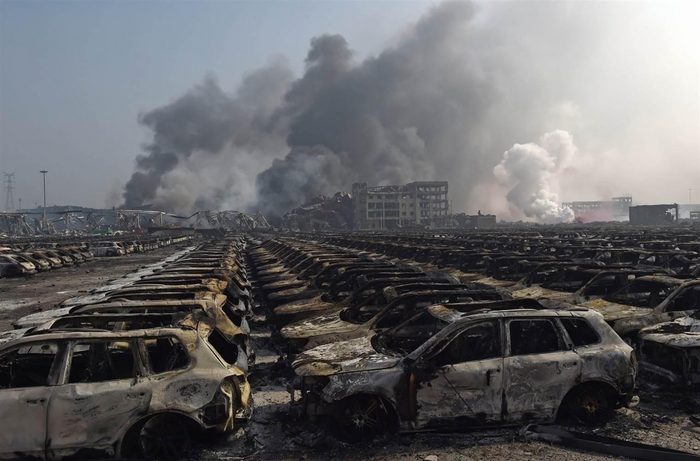
Companies that produce, store or use dangerous goods are required to integrate their security systems with government IT platforms as well as undertake a complete reassessment of major areas of risk by the end of March, according to a government directive. Contingency plans for emergencies and the implementation of regular annual safety drills are also required.
The move follows notice that 25 officials will be prosecuted for dereliction of duty, abuse of power and bribery, in addition to criminal charges brought against around two dozen executives of the company that owned the warehouse where the blasts took place and the safety assessment agencies that it worked with. The 25 charged come from a variety of agencies including customs, urban planning and safety regulators are under arrest and facing prosecution for dereliction of duty, abuse of power and bribery. A further 49 people, reportedly including five ministerial-level officials, are facing administrative punishments and demotion. Two dozen executives from Ruihai Logistics and safety assessment agencies are facing criminal charges.
The official investigation into the blasts concluded they were caused by the ignition of hazardous materials improperly and illegally stored at a warehouse owned by Ruihai Logistics. Fraudulent safety evaluation reports issued by intermediary safety assessment agencies and the bribery of local officials allowed Ruihai to obtain permits to operate, the investigation report stated. Safety assessors were found to have colluded with the company and “deliberately concealed safety problems.”
The exposure of serious problems with safety procedures and intense scrutiny of government regulation and enforcement is expected to have implications for safety procedures at other Chinese ports going forward.
The report said the central government needs to review safety procedures, streamline port safety management, delineate responsibilities clearly, tighten requirements and strictly implement city planning. In addition, there should be improved scrutiny of intermediary organizations responsible for safety and environmental evaluations.
The investigation report put the direct economic losses from the disaster at $1.1 billion, with damage to 304 buildings, nearly 12,500 cars and over 7,500 containers.
It was announced earlier that following the conclusion of safety checks in the aftermath of the explosion, two large chemical plants in Tianjin will be relocated at a cost of $4.4 billion this year. The plants are currently located in a heavily-populated residential area and will be moved to Nangang Industrial Zone in southern Tianjin.
Nangang Industrial Zone is set to become the primary center for chemical enterprises in Tianjin. A total of 85 companies that handle dangerous goods in the Binhai New Area are to be closed or relocated.
On Aug. 12 and early morning of Aug. 13, 2015 two explosions ripped through the Ruihai Logistics warehouse storing hazardous chemicals at Tianjin Port. The blast claimed 173 lives, including 104 firefighters. A second blast took place nearly two months to the day after the initial explosion at a warehouse that was storing more than three tons of alcohol, one ton of acetic acid, 1,700 pounds of glycerinum, and 1,100 pounds of both sodium hydroxide and potassium hydroxide.
Throughput volumes at the port of Tianjin dropped dramatically in the months following the explosions but recovered towards the end of last year, with the port booking full-year throughput slightly above that of 2014.
However, supply chain problems are a continuing concern, with reports that chemical enterprises based in the Tianjin area are required to divert cargoes via the alternative Bohai Rim ports of Qingdao and Dalian. Lack of warehousing space for dangerous goods is resulting in an increase in costs for exporters, and warehouses that already passed the inspections are full to capacity.
